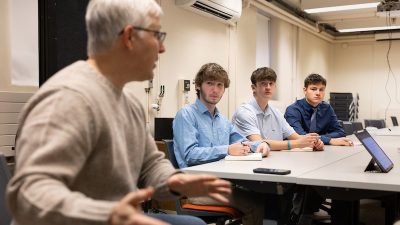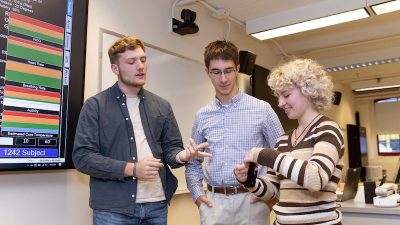“Don’t poke the bear!” Professor Ben Dotger tells his class. EDU 304: The Study of Teaching is meeting in Huntington Hall 070B for group reflection on its final clinical simulation of the fall 2023 semester. It’s a basement classroom, it’s a dull winter morning, and it’s not yet 8:30 a.m. But Professor Dotger’s exhortation has woken up the students.

In this case, the bear is one “Mr. Smithers.” For the student teachers, Smithers is the fictionalized character—played by a hired actor—they most recently tangled with in a simulated parent-teacher meeting, a belligerent parent challenging a 10th grade book assignment. For Professor Dotger, he was a real person encountered early in his career, when he was an English teacher in the southeastern United States.
Professor Dotger confesses that he did indeed “poke the bear” and then got “chewed out” by his principal for arguing back at Smithers.
The point of introducing teachers-in-training to this challenging scenario in a low-stakes environment is so that they can learn skills and strategies to cope: how to read body language, recognize overly aggressive argument, maintain authority and professionalism, keep cool under pressure, and communicate with superiors. But also how to empathize with a parent and understand when natural concern for their child is valid.
Really Quite Mild
Smithers is the proud parent of “Allison,” a straight A student, on the honor roll, active in 4H and Girl Scouts, a future nurse, and, according to dad, with the potential to “change the world.”
The book in question is Siddhartha by Herman Hesse, which Dotger notes is “really quite mild.” Nevertheless, Smithers objects to its references to female body parts and prostitution. He complains that the teacher is “peddling smut” and that the English class, or at least his daughter, should be given an alternative text.
“What’s a one-word descriptor for Smithers?” Professor Dotger queries. “Aggressive,” “passionate,” “conservative,” the students volunteer. But the challenges of this simulation are less about the parent’s moral, religious, or political beliefs and more about book censorship, a challenged curriculum, and a teacher’s authority.
General reflection continues. The logic of a future nurse not being allowed to read a book referencing female body parts is not lost on the students. Professor Dotger notes that the rooms used for this simulation had to be separated more than usual because of all the yelling involved. With a smile, doctoral student and graduate assistant Julie Harnett ’18, G’19 tells the class she encountered much the same scenario 10 years ago.

One difference now is that students from the David B. Falk College of Sport and Human Dynamics collected heart rate, breathing rate, and other data from the teacher candidates, to ascertain how they reacted objectively to the stressful Smithers encounter, after weeks of practice with less contentious scenarios.
The semester-long data collection is part of a National Science Foundation grant—“The Simulation Physiology (SIM-Physio) Data Science Model: Engaging STEM Undergraduates in Data Science Practices”—that provides STEM-focused undergraduates with hands-on training on how to collect, analyze, and communicate human data gathered from clinical simulation subjects.
The hypothesis is that the teacher candidates should be calmer during Smithers—despite the yelling—than they were earlier in the semester, when they were new to one-on-one professional interactions.
It’s the Bear
During the second half of the reflections class, students share with their peers two or three video clips of their encounters, asking what might have been done different.
Andrew is first up. He observes that he started out adamant that he wasn’t going to provide Allison with an alternative text. “That didn’t quite work out,” he admits, as he prepares to share his first clip.
After the parent’s opening gambit to Andrew—that he is “peddling smut”—Professor Dotger interjects: “Smithers is clearly wrong!” He waits for the class to take the bait on that comment. “He’s bringing politics into it,” “He’s claiming to speak for his household,” “He hasn’t read the book!” they say. That last comment is almost certainly true, but Professor Dotger notes that Smithers hasn’t said anything “strikingly egregious.”
He adds, “it’s not our place to tell a parent how to raise a child in his or her own household.”
A second clip. This time, while Andrew is attempting to be civil, Smithers suddenly says, “Have you got any authority in your classroom, or is someone pulling your strings?!” The class groans and laughs. It’s the bear. “If someone pokes at you, how do you respond?” asks Professor Dotger. “I took the Smithers bait when I was a teacher, but cooler heads prevail.”
Call the Ball
It’s Carrie’s turn to share clips. She confesses, “I get so scared in simulations that I don’t know how to start a conversation.” The problem she identifies for her first clip is that her Smithers “just crossed his arms and stared at me.” She asks her classmates to suggest how the conversation could have opened better. “If he’s going to be immature, just let it roll off you;” “Quiet angry is worse than loud angry,” her classmates say.

Professor Dotger asks his GA to play Carrie’s first clip again with the sound off: “Why am I going to give credit for the way she approaches the parent?” Now we can see more clearly how Carrie is leaning across the table with her arms out, while Smithers sits grumpily back in his chair. Light bulbs go on: “Her body language shows she is trying to reach out;” “She has not ceded any space.”
Carrie’s second clip brings up an opposite problem. “How did you guys get him out the door?” she asks. “I didn’t know how to end the meeting!”
Some students laugh when they recall how their scenarios concluded: “Mine ended with a circular discussion;” “Smithers said he wanted to talk to my principal, and I said, ‘OK!'” “Mine went on so long that Professor Dotger had to come in and say it’s over!”
“One challenge of this profession is when to make a call,” observes Professor Dotger.
He tells the class that at one time he wanted to be a Navy pilot on an aircraft carrier—“I thought that was cool”—hence the analogy he uses to explain that it’s the teacher who should end the encounter, using their authority: “When the conversation gets ugly or circular, call the ball. Land that plane.”
